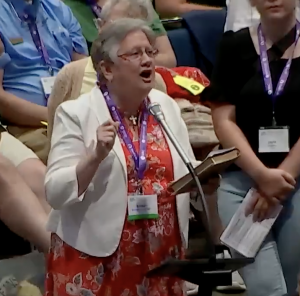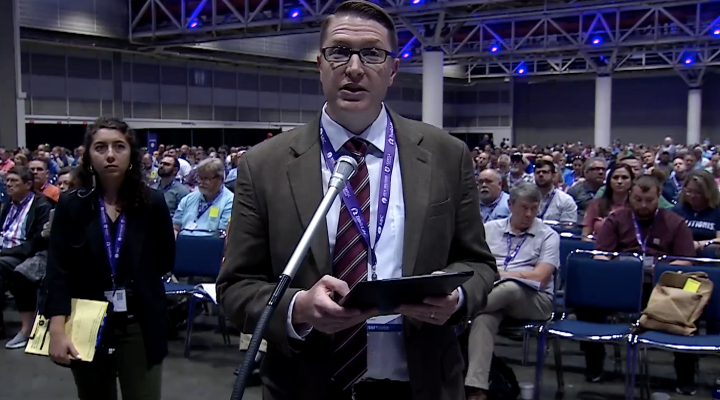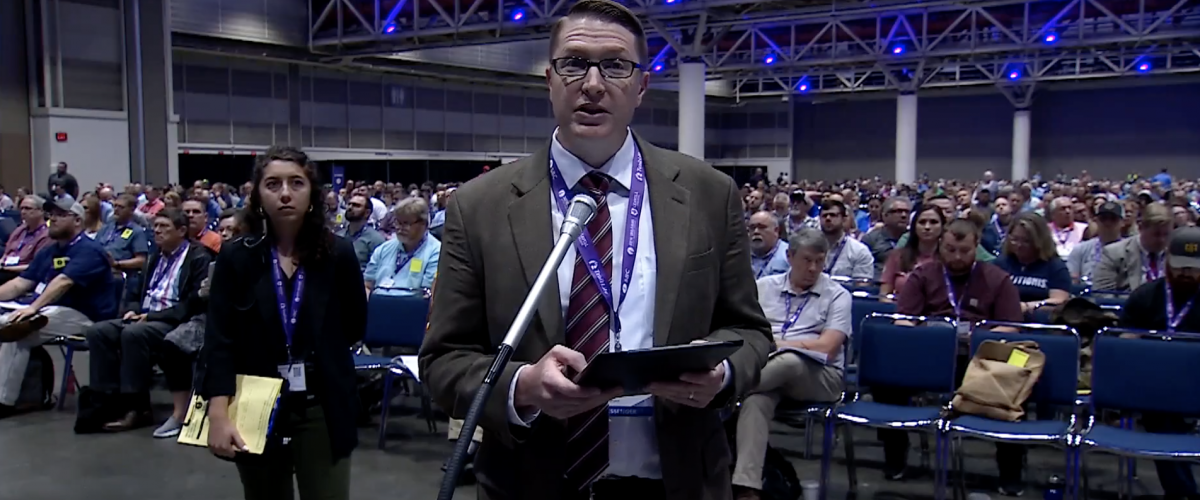Anti-egalitarian forces in the Southern Baptist Convention made a clean sweep of their agenda to exclude women from serving as pastors of any kind in SBC churches.
In the process, they affirmed the expulsion of the denomination’s largest church and overcame a fiery evangelistic appeal from a female pastor who called herself more conservative than most Southern Baptist pastors.
Over two days of events, messengers to the SBC annual meeting in New Orleans adopted a constitutional amendment prohibiting women serving as pastors, adopted two resolutions about the same subject, and affirmed the expulsion of Saddleback Church in Southern California and Fern Creek Baptist Church in Kentucky for allowing women to serve as pastors and preach.
Although messengers soundly rejected the most conservative candidate for SBC president, they eagerly affirmed the most strident actions against women in modern history. Their message was clear and unequivocal: Only men may be called “pastors” and serve as pastors.
“They eagerly affirmed the most strident actions against women in modern history.”
The fight for male-only leadership in the church was sold as a biblical mandate. The chief apologist for this movement, seminary president Al Mohler, spoke twice to give a theological basis for the convention’s actions.
Although most ordained women and most churches that ordain women left the SBC 30 years ago, a new and unlikely wind of inclusion has blown through some SBC churches in recent years. That is exemplified by Saddleback Church, where founding pastor Rick Warren had a recent epiphany while studying Scripture that God calls and uses both men and women to preach the gospel.

Linda Barnes Popham addresses messengers to the 2023 SBC annual meeting in New Orleans.
Linda Barnes Popham, pastor of Fern Creek Church in Louisville, Ky., is an outlier within the SBC, where the number of female senior pastors is so small as to be unknowable. However, many other SBC churches have given women the title “pastor” in new ways — children’s pastor, youth pastor, associate pastor, missions pastor.
To remain in good standing with the SBC, none of that will be allowed now.
Messengers adopted the first reading of a motion presented last year by Virginia pastor Mike Law that enshrines a new membership requirement in the SBC constitution: “Does not affirm, appoint or employ a woman as a pastor of any kind.” The amendment must be ratified in another vote next year.
Only churches may be “members” of the SBC. Individual Baptists are members of local churches and relate to the denomination only by virtue of their church membership.
While the fate of Law’s amendment had been in doubt — and hotly debated — over the past year, when it finally was put to a vote it won by a show of hands. Even though a constitutional amendment requires a two-thirds majority, the vote was so lopsided the presiding officer called it without hesitation. By the time of this vote on Wednesday afternoon, the second day of the meeting, the vast convention hall appeared to be about half full.
“When it finally was put to a vote it won by a show of hands.”
The votes to affirm a previous decision of the SBC Executive Committee to expel Saddleback and Fern Creek churches happened the day before and were conducted by secret ballot. The results of those separate ballots were not reported until Wednesday morning.
The vote was not close. Fern Creek was ousted by a 91% majority. Saddleback was ousted by an 88% majority. (The convention also ousted a third church accused of harboring a known sex abuser as pastor by a 96% majority.)
Immediately after the vote to remove Saddleback and Fern Creek was announced, leaders of the Cooperative Baptist Fellowship issued a statement declaring their continued support for women in all forms of ministry. CBF was formed in 1991 as a breakaway group from the SBC, largely over the issue of women in ministry but also about differing views on biblical authority.
Leaders of the Cooperative Baptist Fellowship issued a statement declaring their continued support for women in all forms of ministry.
CBF “holds deeply the conviction that God calls women to all places of leadership and service in the lives of congregations and in our denominational community,” said Paul Baxley, executive coordinator, and Debbie McDaniel, moderator. “We believe this conviction rises from the Scriptures and has been confirmed time and time again by the work of the Holy Spirit in calling and gifting women for preaching, pastoral leadership and other forms of ministry.
“The congregations served by women ministers benefit richly from the gifts, graces and unique understandings and experiences they bring to the preaching of the gospel, the leadership of congregations and the care of people across all seasons of life.”
The CBF leaders said their fellowship of churches still has “work to do to live out these convictions. … We must be relentless in our resolve toward complete synergy between the faith we profess and the faith we live. Jesus is working among us, challenging us, encouraging us, ultimately to transform us until this synergy beautifully exists.”
Unlike the SBC, “as a Baptist denominational community, our calling is not to police the actions of congregations; instead, we strive to be a fellowship in which congregations and their leaders learn from each other, encourage one another and become instruments of God’s grace to each other as a real priesthood of all believers,” Baxley and McDaniel said.
While CBF and the Alliance of Baptists — another breakaway group from the SBC — would welcome the unknown number of churches that will leave the SBC now, those churches may find themselves denominationally homeless.
Both CBF and the Alliance, to differing degrees, are viewed as “liberal” by many Southern Baptists because neither group supports biblical inerrancy, the shibboleth on which the previous schism in the SBC was aligned.
Whatever happens, the SBC will become smaller.
Mike Law, author of the SBC constitutional amendment, urged its passage as a means of clarifying and strengthening cooperation in the denomination. This will lead non-Christians seeking spiritual guidance to find truth in SBC churches, he said.
But Bob Bender, a retired pastor from Colorado Springs, Colo., begged SBC messengers not to adopt the Law resolution. “All the liberals have left,” he said, explaining this is a matter of infighting from those who want Southern Baptists to “march in lockstep like North Korean soldiers.”
Southern Baptists previously were wrong on slavery, segregation, “alien immersion” and the ordination of “biblically divorced” deacons, he said. “History will prove us wrong again if we adopt this motion.”
Related articles:
The Southern Baptist Convention is wrong | Opinion by Meredith Stone
Saddleback and Fern Creek churches face off against Al Mohler at SBC meeting
Female pastors: Appointed or apostate? Southern Baptists decide | Opinion by Melody Maxwell
An open letter to all Southern Baptists | Opinion by Rick Warren
A primer on why Southern Baptists are fighting over women in ministry once again | Analysis by Mark Wingfield


